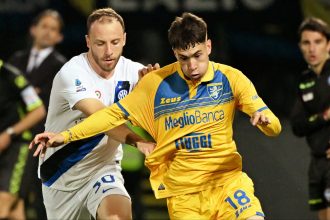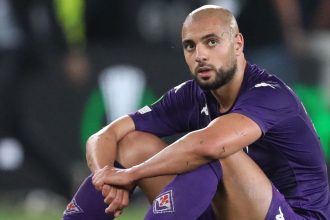The dynamic duo are the key for Julian Nagelsmann's side as they look to arrest a run of poor tournament showings on home soil
German newspaper pulled no punches after the country's national team were eliminated from the 2022 World Cup at the group stage. They dubbed Germany's dramatic exit as "the end of a once great and proud soccer nation". Hyperbole aside, the failure to get out of an admittedly tricky group in Qatar was an embarrassment back home.
Germany may have been a squad stuck partially in between generations, but there were few excuses to be found. This was a group of world-class players, led by a manager in Hansi Flick who two years earlier had led Bayern Munich to a treble. They didn't have to win the World Cup, but Germany were supposed to at least get out of their group. That failure, combined with a run of poor results that followed it, led to Flick being removed from his post in September.
Eighteen months on from that World Cup embarrassment, though, it feels like things are moving in the right direction for the Euro 2024 hosts. Julian Nagelsmann, after a tricky start to his tenure, has stripped it all down, entrusted a young core to do its thing, and shed the Bayern Munich loyalties that were arguably holding the side back.
At the centre of it all is an attacking midfield duo with a combined age of 42. Florian Wirtz and Jamal Musiala are two of the most exciting, incisive talents the sport has to offer, and over the next month, they will line up together for Die Mannschaft, a dynamic partnership challenged with restoring glory to a national team in shame. In truth, despite their inexperience, they likely hold the key to making this a tournament to remember for the hosts.
(C)Getty ImagesFailure after failure
When Germany won the 2014 World Cup, it felt like it would spark a period of success for the national team. Then-manager Joachim Low had pieced together an impressive and watchable side, built around Mesut Ozil, Thomas Muller and Toni Kroos, with the world's best goalkeeper, Manuel Neuer, keeping things tight at the back. Most of the squad was either in its prime or moving towards it. Here was a unit set to dominate European football for years.
Of course, it didn't work out that way. After making it to the semi-finals of Euro 2016, the team fell off a cliff. They were eliminated at the group stage of the 2018 World Cup, in the last 16 of the pandemic-delayed Euro 2020, and crashed out in the groups in Qatar 18 months ago.
Perhaps even worse, though, was the reluctance of those in power to change things. Low stuck around for one tournament too many, while Flick deployed largely the same group of veterans as his predecessor – even when they were all out of form. Young talents were neglected, while ageing ones toiled their way to successive tournament disappointments.
AdvertisementGetty ImagesMagic Musiala
Flick did get something right, though. In Qatar, the manager had the foresight to bring a 19-year-old Musiala into the team, deploying the Bayern attacking midfielder on the left side of a 4-2-3-1 formation. And although Germany were miserable for most of the tournament, Musiala served as a rare bright spark. It was, in fact, the one positive that the German press found in their scathing assessment of the side, as former boss Jurgen Klinsmann noted that: "We have one wonder-child, there's no doubt about it, in terms of performances in Musiala – he is an exceptional, exceptional player."
Naglesmann has continued to lean on the youngster. The ex-Bayern boss has eased out an older generation, and made Musiala the focal point of his team. These days, Bayern's creative maestro comes off the right, with Ilkay Gundogan playing a more restricted role centrally.
For Germany, Musiala's duty is to pace things. Sometimes he dribbles, other times he circulates. When the 21-year-old has the ball, everything sort of slows down as he weaves through bodies and squeezes through gaps that don't really exist.
His showing against a full-strength France in March best encapsulated his abilities. Musiala completed the most passes out of any of Germany's attacking quartet, successfully dribbled past three opponents, touched the ball 81 times, and assisted his side's second goal in a 2-0 win over the Euro 2024 favourites.
GettyWirtz the wizard
Wirtz would have perhaps been in the same team as Musiala in Qatar had his rise to superstardom not been delayed by injury. He was Bayer Leverkusen's youngest-ever debutant when he took the field aged just 17 years and 16 days in early 2020, and just over two weeks later, he became the Bundesliga's youngest goal-scorer. He made his Germany debut at 18, and by 2021 was assumed to be on the rest-of-the-league to Bayern pipeline.
But things changed when Wirtz tore his ACL in the spring of 2022. His progress was stalled, and while he missed the chance to go to his first World Cup, it may have turned out to be something of a blessing in disguise. By the time Wirtz returned to action, Xabi Alonso was Leverkusen's coach, and the Spaniard has taken the attacking midfielder's game to another level.
Wirtz has become a more direct presence under Alonso, operating on the inside left of a 3-4-2-1 formation. He is an expert at turning his man and running at defences, and has the dribbling nous to find gaps. His season tally of 18 goals and 20 assists in all competitions rightly have him in the Ballon d'Or conversation.
So while Musiala slows the game down for Germany, Wirtz can speed it up. Put the two together – with Gundogan providing support between them – and the combination is a potentially deadly one.
getty imagesPerfect system
Nagelsmann's influence here is undeniable. The German has shown he has what it takes to be spoken about among the top tier of coaches, and he was perhaps unfortunate to be sacked by Bayern in March 2023. Now, he seems to have found the perfect team with whom he can rebuild his reputation.
Nagelsmann has set Germany up much like a club side, asking them to play his distinct quick, gegen-pressing style, relying on three attacking midfielders and one unorthodox false nine to grab the goals.
That man through the middle, Kai Havertz, certainly has his detractors, as the Arsenal striker has become infamous for his ability to miss big chances. But towards the end of the 2023-24 season, he started to find the net – and there were glimpses as to how he could function as an ideal attacking focal point. It might just translate to Germany, too.
When Havertz roams, spaces open up – and Musiala and Wirtz have opportunities to work their magic. Those clever off-ball elements to his game won't detract from his questionable goal-scoring record, and nor will it remove fears that Germany probably need a more incisive presence elsewhere on the pitch to put the ball in the net. But Havertz does allow Germany's best two attacking talents to do what they do best.






